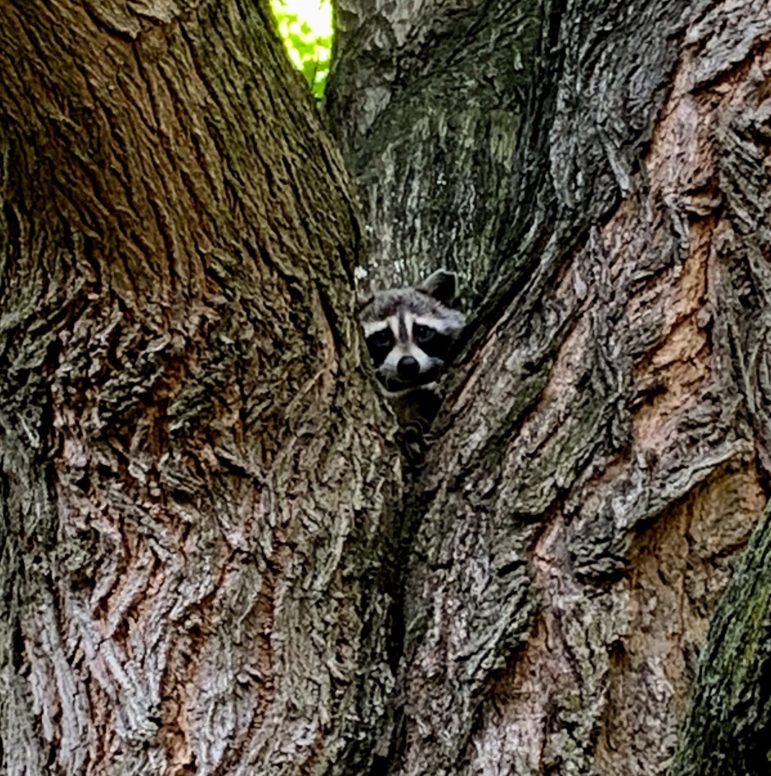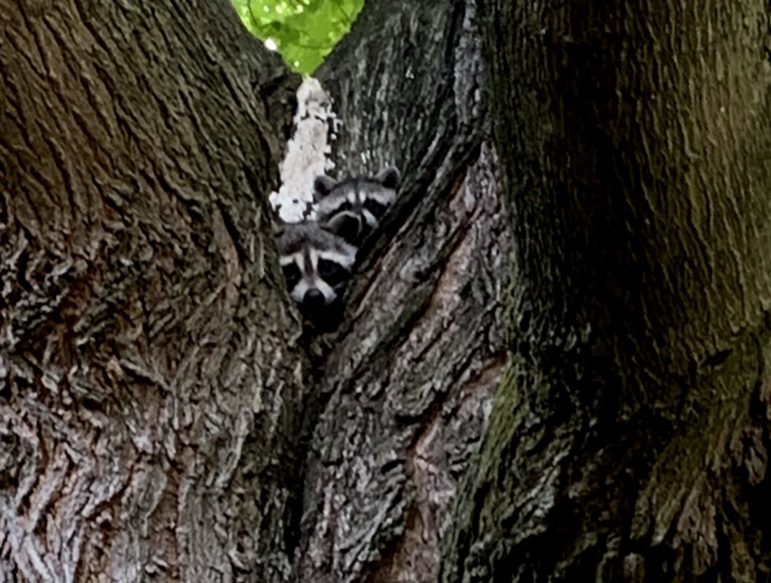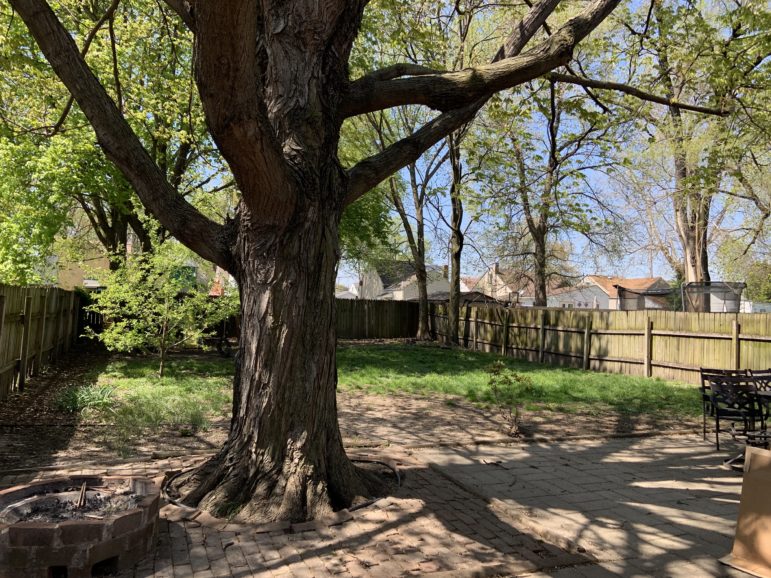
“Eric,” my wife calls to me. “Come back here to the kitchen. I think there are raccoons in the yard.”
I follow her back to the kitchen, which looks out on our yard in southern Illinois, just over the river from St. Louis. This place is still new to us: we only moved here in the middle of April, which is not objectively a long time, though some nights it already feels like we have lived here for years. My wife was making herself a sandwich when she heard a babble of noises from outside and looked up. She points out the window and I follow the line of her index finger, up to the crook of the silver maple that rests in a circle of bricks just outside our back door.
At first I only see the gray bark of the tree, but then I plainly see the face – the white chin, the daggered ears, the black mask surrounding wise and liquid eyes. We watch each other through the window, neither of us making a sound.

The mother raccoon, staring down at the author [E. Scott]
The altar is simple: just the knife and the cup, and all the worlds which they contain. It is Beltane, our first in this new home, a golden Friday afternoon. I pour mead into the chalice and offer it to my new friend, the silver maple tree.
For six years I lived in a house with a honey locust tree in the front. I got to know that tree well over that time – the way its bark molted off and revealed the smooth wood of its trunk, the months that it would spread its unnumbered leaves over the yard and the windshield of my car, the temperament of the land-wight that dwelled within and was it. On important days of my life, I would stand beneath the branches of the honey locust and offer it beer or cider or mead; I would tell it about the course of my life and it would listen. The honey locust was a little god, but none knew me better, and I loved it for its silence and the light that filtered through its limbs.
When I moved away from that house, the landlord cut down the honey locust and left its trunk to rot in the yard. One night before we left that town I drove up to my old house and stole one of the slices of that tree, still wet with the late snow of March; someday, I tell myself, I will make an altar out of that stump, something sacred and enduring, because that tree was my friend, and because given the choice I would always take a messy, leaf-dropping tree over a perfectly manicured lawn.
When we first visited our new home, my wife and I gasped at the sight of the silver maple tree in the back yard. I was primed to fall in love with a tree, I recognize: we were looking for a house that we might remain in for a long time, perhaps forever, and by that point in our search, we were sick of looking at houses, sick of making judgments on whether or not to keep a given property on our list, sick of setting our hearts on a place based on the pictures and walking in to find the roof collapsing or the plumbing missing. But we found this house with the maple tree in the back yard, and we had the same reaction: this was a tree, we thought, that we might grow old with.
We were alone at Beltane, but we strung the maple tree with ribbons and danced it like a maypole nevertheless; we offered it the chalice of wine and a handful of corn muffins. We spoke to the landwight that was within and was the tree, asked for its friendship and partnership. And though trees are silent, I like to think it heard our offer and accepted.

The silver maple tree [E. Scott]
Within the limbs of the silver maple tree, we count three raccoons – a mother and two kits. The cubs clamber over their mother and each other, never venturing far away, but the mother raccoon sits at the crook of the tree and looks down at us. She does not seem afraid of humans or our cameras, but neither does she seem to trust us. I look into her eyes and think of Robert Burns:
I’m truly sorry Man’s dominion
Has broken Nature’s social union,
An’ justifies that ill opinion,
Which makes thee startle,
At me, thy poor, earth-born companion,
An’ fellow-mortal!
“Should we leave them something?” I ask as if leaving the raccoons a slice of bread would convince them of our good intentions.
“No,” says my wife, softly. “Better that they stay wild.”
“They live in Belleville, Illinois,” I say in return. “Nothing here is all that wild.”
She is right, I know. Still, I find myself wishing I could speak to these masked beings and tell them that I would like them to feel safe and happy here. But perhaps that’s not mine to say; perhaps those promises belong instead to the tree.

Two raccoons [E. Scott]
My mother visited yesterday. I had not seen her since Candlemas, which seems like many years ago. She brought by an electric weed-eater and a package of blueberry-flavored bratwurst as house-warming presents. (We planned to have a housewarming esbat in early April, but we all know the Yiddish proverb about gods, plans, and laughter.)
We sat in the back yard, where my wife had set to redoing the brickwork around the base of the maple tree. I kept six feet away from my mother, feeling like a demon at the edge of a salt circle, and we talked about gardening and our jobs and gossip about our friends and coven-mates. At times we talked about the people we knew who have passed away during the last two months, who remain, at this writing, unburied.
My mother did not stay very long, just a little over an hour – a storm was coming, or so the forecast claimed, and she lives more than an hour away. “I wish I could hug you,” she said as I walked her to the street. “But there’ll be time enough for that soon, I’m sure.”

The silver maple tree [E. Scott]
“At this age raccoons move from place to place with their mothers,” my wife tells me. They probably will not stay here long, then; just for a day, maybe two. We are watching them nap, still laying in a pile of fur in the neck of our friend the tree. They will wake up sometime this evening, and continue on their way.
My wife continues, telling me that the kits will stay with their mother until the winter, when they will strike out on their own. Until then, they will wander around our neighborhood together, foraging at night and sleeping in the warm of the afternoon, occasionally lifting their muzzles to look at wondering humans with their brandy-colored eyes.
I pour myself a glass of orange juice and glance up at the nook of the tree. The mother raccoon lay there sleeping, one of the cubs lounging pressed against her ear. They do not seem afraid of my clumsy human noises, for which I am grateful.
In the times past when I was lucky enough to wander alone as a pilgrim in unfamiliar places, I remarked to myself that no matter how far from home I strayed, I always found companions, always found that thing Edith and Victor Turner called communitas. In these strange times where home seems the most unfamiliar place of all, I still find that to be true – there are always fellow travelers to be found, though some are beasts, and some are trees.
Editorial Correction: Upon careful inspection, Eric has informed the editorial team that there are 5 raccoons in the gaze rather than the reported 3.
The Wild Hunt is not responsible for links to external content.
To join a conversation on this post:
Visit our The Wild Hunt subreddit! Point your favorite browser to https://www.reddit.com/r/The_Wild_Hunt_News/, then click “JOIN”. Make sure to click the bell, too, to be notified of new articles posted to our subreddit.